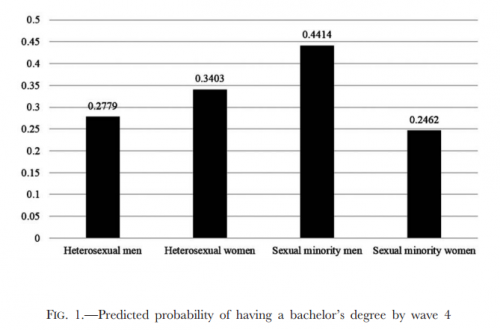For every man that earns a college degree, nearly two women will. Women have been outperforming men in college since they started attending in the 1920s, but thanks to widening opportunities, an economy that draws women in the workforce, and simple female ambition, women now outnumber men, too.
New research suggests, however, that the opposite is true for sexual minority men and women. Education researcher Leigh Fine asked whether the college graduation rates of gay, lesbian, and bisexual men and women reflected what we see in general. His respondents were 30 years old, on average — that is, old enough to have passed the age where most Americans complete their education — and they self-identified as non-heterosexual.
He found that the pattern we see in which women are more likely to earn a bachelor’s degree is reversed among sexual minorities. Gay and bisexual men are more likely to report graduating than lesbian and bisexual women. In fact, they’re more likely to report graduating than heterosexual men and women as well.
In contrast, sexual minority women were the least likely of all four groups to report graduating.
Running some fancy numbers — it was pretty tricky because of the low numbers of sexual minority respondents — Fine concludes that what we are seeing is a pattern among sexual minority women that is statistically similar to heterosexual men and a pattern among sexual minority men that is statistically similar to heterosexual women.
This is another great example of the importance of doing intersectional research. Sociologists use the term intersectionality to draw attention to the way that our identities — our race, gender, class, sexual orientation, immigration status, etc — never influence our lives in isolation from one another. They’re in cahoots. So, being female is one thing, but being a woman who sleeps with women is an entirely different thing, and being such a woman who lives in the country, carries a disability, or is a transnational migrant is entirely another. We’ve got a pretty interesting set of over 300 related posts at our intersectionality tag. Enjoy!
H/t to Education and Society. Cross-posted at Gender and Society.
Lisa Wade, PhD is an Associate Professor at Tulane University. She is the author of American Hookup, a book about college sexual culture; a textbook about gender; and a forthcoming introductory text: Terrible Magnificent Sociology. You can follow her on Twitter and Instagram.

Comments 13
dandanar — June 2, 2015
Fascinating finding! Also, the link to the underlying article doesn't seem to work (redirects to the Occidental College Library proxy).
word — June 2, 2015
A college graduates students, students graduate FROM college.
pduggie — June 2, 2015
Interesting. Point taken about intersectionality.
Does everything count though? You mention "our identities" as things that matter and make a difference. But some things seem too transitory to be identities. Immigration status, education, class seem much more changeable for one. Someone might even suffer from some disabilities only temporarily.
From another perspective, we could lump all the "educated" together as an identity. And then what? We could say: The educated are more likely to have well paying jobs than the uneducated. What can we do to make more uneducated people also have jobs?
(missing that, well, educating them might be just the ticket: but that changes their identity! Almost like quantum physics or something)
Bill R — June 2, 2015
Part of women's success in school is linked, I believe, to their relative conservatism toward social norms that leaves them more likely to conform to rules set by educational institutions. Gay women might be less likely to conform (they're used to being different) and therefore less likely to succeed in a highly structured social environment like college.
Dan — June 3, 2015
If women both outperform men while in college, and now graduate in greater numbers, wouldn't that suggest that social norms are rigged against men, working to prevent their educational advancement? Is the fact that this question isn't even considered an example of female privilege?
Research More Women Graduating Than Men and More | LANDsds Sustainable Voice -The NeXuses — June 5, 2015
[…] data that states “WOMEN GRADUATE COLLEGE AT HIGHER RATES THAN MEN… UNLESS THEY’RE GAY.” For every man that earns a college degree, nearly two women will. Women have been […]
Sunday Morning Paper: Truth & Beauty Bombs | perfect worry — June 6, 2015
[…] Women graduate college at higher rates than men… Unless they’re gay […]
WOMEN GRADUATE COLLEGE AT HIGHER RATES THAN MEN… UNLESS THEY’RE GAY | Welcome to the Doctor's Office — July 2, 2015
[…] by Lisa Wade from SocImages […]
Women Graduate College at Higher Rates Than Men Unless They’re Gay | — July 7, 2015
[…] By Lisa Wade, PhD. Originally posted by Sociological Images (here). […]